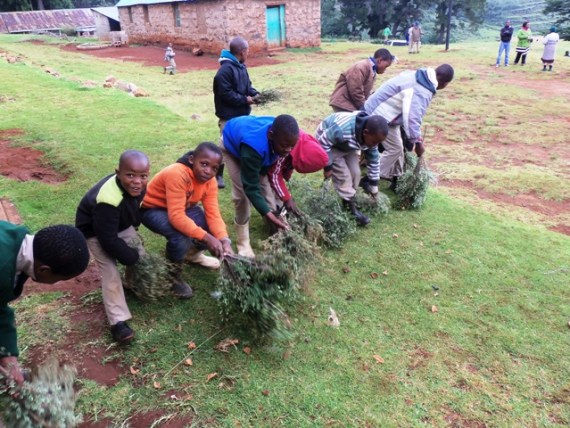
I am amazed to see how very young children in my rural village in Lesotho, are left to entertain themselves without toys or adult supervision.
As I sat on Mary’s porch, I watched these, one to three-year-olds, playing together with stones that they lined up or rolled on the tile. This kept them busy for about two hours without a single child crying or whining. They are so used to figuring out how to keep busy with nothing other than what they can find in nature.
Things are different at my school though. It came as a shock to see how children are often treated as ‘servants’ who are pulled out of class to run errands for the teachers. They have no choice, and are expected to obey, without ever questioning the teacher: “Why are you making me skip class to collect your cell phone at so-and-so’s house?”
When the child returns with the cell phone, the teacher grabs it, without a “thank you.” It’s expected. Rarely do I hear a teacher thank a student.
I understand why my own students grab pencils and pens from me, without saying, “Thank you.” I don’t put up with the lack of good manners, so I hold onto the pencil and say, “What do you say?” Often they are unsure of what I mean, so I ask them to repeat, “Thank you ‘M’e Sonia.”
I’m not opposed to children helping at school, it just bothers me when I see ten-year-old children carrying heavy desks across the school property. Once I ran over to help them lift the desk over a step, and one of the male teachers yelled, “’M’e Sonia, you should not be doing that.”

Twice a day, after the morning liquid porridge, and the maize meal with dried beans for lunch, I see tiny, under-nourished, first graders schlepping buckets of water uphill, to wash their plastic lunch containers. They wash their dishes in cold water with no soap. Their hands are sticky as they scoop liquid porridge with their fingers; they don’t have spoons. The teachers have spoons and proper bowls, but not the children. It reminds me of the three little bears, where Papa Bear has a big bowl, Mama bear a medium bowl, and baby bear has a tiny bowl. This is definitely a culture where the adults get fed more, and (meat, if there happens to be a special event, like Moshoeshoe Day) and the kids don’t.
During lunch, the children are expected to serve the teachers breakfast and lunch. When they want water, the teachers point to their plastic bottle, and the child runs to the tap and fills it.

Fridays are always “cleaning” days, and the children in each grade run into the woods to get branches to sweep the floors in their classrooms and the front yard. They sweep the staff room, and attempt to dust the tables in the staff room with a dirty rag.

Can you imagine asking our 1-3 year-olds in America to entertain themselves and our primary school children to clean the floors and sweep the grass?

I am of the generation of American kids who came home from school, changed clothes, had a snack, and went out to play unsupervised until the street lights came on. We kids decided what to do, how to do it, how to handle disagreements among us. I’m not sure what happened when I was younger than primary school in terms of supervision. On the other hand, my grandchildren (those raised in China as well as those raised in the U.S.) were never alone without an adult hovering over them. Activities were programmed. And cell phones made it possible to always call and ask mom to solve any problem.
Even in America, children were once considered “little people” and not in need of special treatment and laws to protect them. Extremes are often unfair in different ways.
Yes, it was different. What fascinates me is how these tiny children are allowed to crawl around with barbed wire fences, animals all over, like cats, dogs, horses, donkeys, pigs, and they seem to not get into trouble, or eat anything they shouldn’t put in their mouth.
Sonia Marsh recently posted..Children in My Village in Lesotho
Those cute little children look happy to me; perhaps because there’s the Peace Corps teacher looking after them so well!
I think there must be some good aspects in the education those children on the whole are getting at the school, it can’t all be bad; just as what we’ve provided for our children in the “advanced” modern civilizations hasn’t all been good, far from it.I just wish educational matters could be taken a step further and at a higher level, and that leaders worldwide could put all aspects of education at the top of their agenda. It is through education that we can ever hope to change the awful world in which we live.